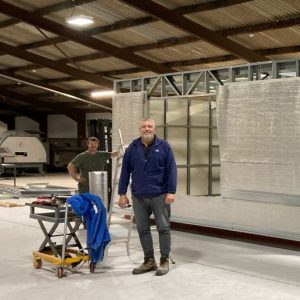Hardwicke site models housing pods

An innovative project in Hardwicke, Gloucestershire, could help to tackle the problem of a lack of affordable accommodation in local communities.
The plan is to create high-quality ‘relocatable ‘ buildings on land that has been earmarked for housing development but is unlikely to be built on for some years.
Bishop Rachel, who is the Anglican Bishop for HM Prisons in England and Wales, explained that the project hoped not only to provide housing for people who have been in prison but also skills training and employment for people in prison, to maximise their post-release employment opportunities.
Bishop Rachel introduced Angus Fraser of MMC Solid Wall Structures to some work in the South West around reducing reoffending as it is known that employment and stable accommodation are major drivers to reducing reoffending. A specialist zero-carbon architect has helped to create a net-zero design for the pods and to build a sample pod, which is now ready to be showcased.
Angus explained that the technology being used is created to have a low environmental impact – all waste from light gauge steel frame is 100% recyclable, the walls and insulation feature recycled Welsh slate, milk cartons and natural cork, delivering an EPC A rating, near Passivhaus airtightness and is totally non-combustible for fire safety.
The project aims to provide clusters of homes, creating communities for the people who will live there, some of whom will have been in prison and will be provided with wrap-around support.
Bishop Robert, Bishop of Tewkesbury said, “This is a tremendous example of the approach the Church has been advocating in Coming Home to tackle the housing crisis and provide sustainable, safe, stable, sociable and satisfying homes that all can access.”
The Church of England has set out its intentions towards tackling the housing crisis in its Coming Home Report, using Church land for building homes that are truly affordable or can be used for people with specific needs, such as those needing supported-living accommodation, people who are homeless, people who have been in prison, or those who are refugees.
Angus said, ” Our vision is to scale this project nationally so we are manufacturing via multiple small relocatable community factories that are positioned locally and close to project sites to provide local employment and training to residents of the neighbouring area (which includes ex-offenders) as well as much needed quality living.
“My overarching aim is for the Church to provide leadership to society who are in crisis at the moment. Coming Home is an example of a leadership opportunity that will have positive outcomes. The research and report are terrific but we must deliver on it. I feel this project is an example of Coming Home happening and delivering.”
Bishop Rachel expressed her excitement about the project’s potential and said, “This could be a wonderful example of how the Church joins in with God’s work of transformation and reconciliation, as well as what becomes possible when we invest in partnerships to build community and work for the flourishing of people and place. I am deeply grateful to Angus and others who have been willing to engage with this so enthusiastically.”
Alison Hernandez, Police and Crime Commissioner for Devon, Cornwall and the Isles of Scilly, and Chair of the South West Reducing Reoffending Partnership (SWRRP), who has supported a successful modular eco-home project in Devon involving serving prisoners in the construction and someone on probation in the assembly, said: “Projects such as these really help people who have been in the prison system and make sure they have purpose both in prison and outside. They also have the ability to solve the affordable housing crisis at the same time.
Communities want to see people succeed and contribute positively to society. It helps prisoners learn valuable modern construction skills. This is about keeping people busy and giving them a purpose on something that is really useful to our society. The skills they learn will stand them in great stead when they leave the prison system and help break that cycle of reoffending that can so often become a miserable trap.”
The first ‘living pod’ will be showcased at Open Days on 14 and 15 December in Hardwicke, Gloucester. To find out more, contact Angus Fraser on afraser@mmcfasttrack.co.uk
Note to editors: The MMC Solid Wall Structures Full Holistic Overview.
.

Comments
Post a Comment